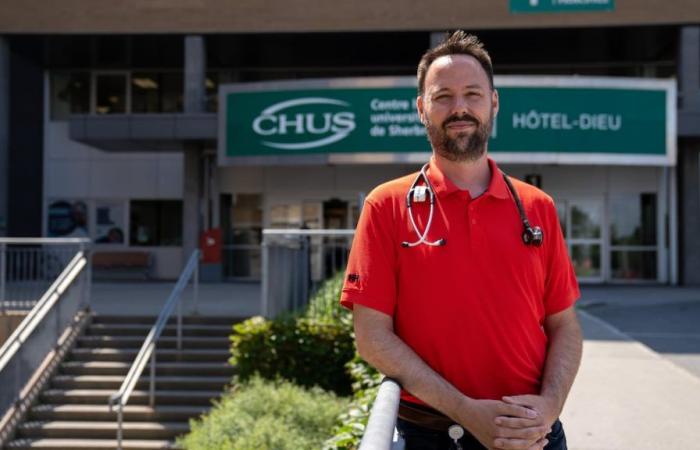We all know someone who at one time or another has wandered through the health system before getting a clear diagnosis and the appropriate treatment. The most famous case that has come to light in recent weeks is that of Celine Dion and the stiff person syndrome. Even with the best specialists in the world at her disposal, it took several years for the singer to understand what was happening to her. This problem of diagnostic wandering is common, but difficult to quantify precisely. Fortunately, it is recognized and many experts are working to solve it.
Dr. Jean-François Ethier, internist at CHUS and professor at the University of Sherbrooke, is closely interested in this question. It must be said that his specialty is that which involves many complex cases which must be turned over in all directions before being able to fully grasp them.
Open in full screen mode
Dr Jean-François Ethier wants to reduce diagnostic wandering using digital tools.
Photo: Radio-Canada / ANDRÉ VUILLEMIN
People who are affected by the problem of diagnostic wandering often have symptoms that affect several organs, several systems of the human body. To put all this together and try to make a coherent story to find the right answer, we often go to internal medicine specialists.
In internal medicine, we see a lot of patients for whom we cannot find a diagnosis and who unfortunately have been in the system for a long time. It is certain that, on a human level, the impacts are very significant.
The causes of diagnostic wandering
Wandering can be explained in several ways, he explains. First, the difficulty of accessing medical resources, a factor regularly criticized in our overloaded public network. Another condition favorable to wandering: an illness which develops very slowly, over the long term. At first, it will be symptoms that are vague and very difficult to link to a diagnosis or that could be compatible with several diagnoses.
Open in full screen mode
Patients must wait years to obtain a diagnosis and the appropriate treatment for their health problem.
Photo: Radio-Canada / ANDRÉ VUILLEMIN
The third situation encountered is that the sick person has common symptoms, but which ultimately reveal an unexpected diagnosis. We’ve all been fooled as clinicians. Thinking it’s pneumonia and then finding out it’s inflammation around the lung.
he cites as an example.
To complicate matters, there are also what are called rare diseases, sometimes completely unknown to family doctors and difficult to identify by specialist doctors. For Dr. Ethier, it is essential to help front-line workers detect cases that are unfamiliar to them.
In search of its… digital twin
One way to do this is to create a database that can match a patient’s symptoms with others who have or have had the same symptoms. Dr. Ethier calls it digital twins. A hopeful solution for patients who feel like their case has been swept under the carpet.
Open in full screen mode
Dr. Ethier is working with other specialists to create a database to create digital twins who share the same symptoms.
Photo: Radio-Canada / ANDRÉ VUILLEMIN
Being able to say: what information about your situation is most important? [Ensuite]we virtually represent you with this information. And we will look at the data set to see if people have a representation similar to yours.
Valuable data to be collected
The challenge in creating this digital medical assistant is to have access to patient data. Most of it is scattered here and there: in medical clinics, in hospitals, at the occupational therapist or physiotherapist. Even in the patients’ smartwatches there is cardiac and respiratory data that could be very useful, he explains.
It is very difficult for someone to quantify their activity when they are in front of a caregiver. If we simply had access to their smart watch […] we would have many markers which would subsequently allow us to create the digital twin.
Open in full screen mode
Specialists in medicine, ethics, law and computer science are working to develop digital health technologies that will help make diagnoses.
Photo: Radio-Canada / ANDRÉ VUILLEMIN
Dr. Ethier, who is co-director of the Interdisciplinary Research Group in Health Informatics (GRIIS), dreams of the day when it will be possible to have access to all patient data, medical research results and to cross-reference all this information to put together the puzzle to arrive at a diagnosis.
Obviously, the first question with this is to ensure that we have patients’ consent and that it is used safely.
Tools soon to be tested
The day when digital tools will be available is not so far away. Already, a project is on track at the Charles-Le Moyne Hospital in Longueuil, which is in the University of Sherbrooke network. The idea is not to centralize patient data in the same file, but rather to find them where they are.
We hope to be able to deploy these tools on the front line. Not necessarily to find the final answer, but to be able to screen for potential illnesses, then be able to make a referral to the appropriate specialists to confirm or refute that diagnosis.
Open in full screen mode
“In internal medicine, we see a lot of patients for whom we can’t find a diagnosis and who unfortunately have been in the system for a long time. It’s certain that, on a human level, the impacts are very significant,” says Dr. Jean-François Ethier.
Photo: Radio-Canada / ANDRÉ VUILLEMIN
Dr. Ethier is also impatient to see his research team assembled in a few weeks on an entire floor of a new pavilion in the health complex at the CHUS-Hôpital Fleurimont. Specialists in medicine, ethics, law and IT are working to develop digital health technologies that will help make clearer and faster diagnoses.
This will, I think, allow even more interesting progress because everyone will be physically on site. There will be a lot of active forces trying to push this kind of issue.






